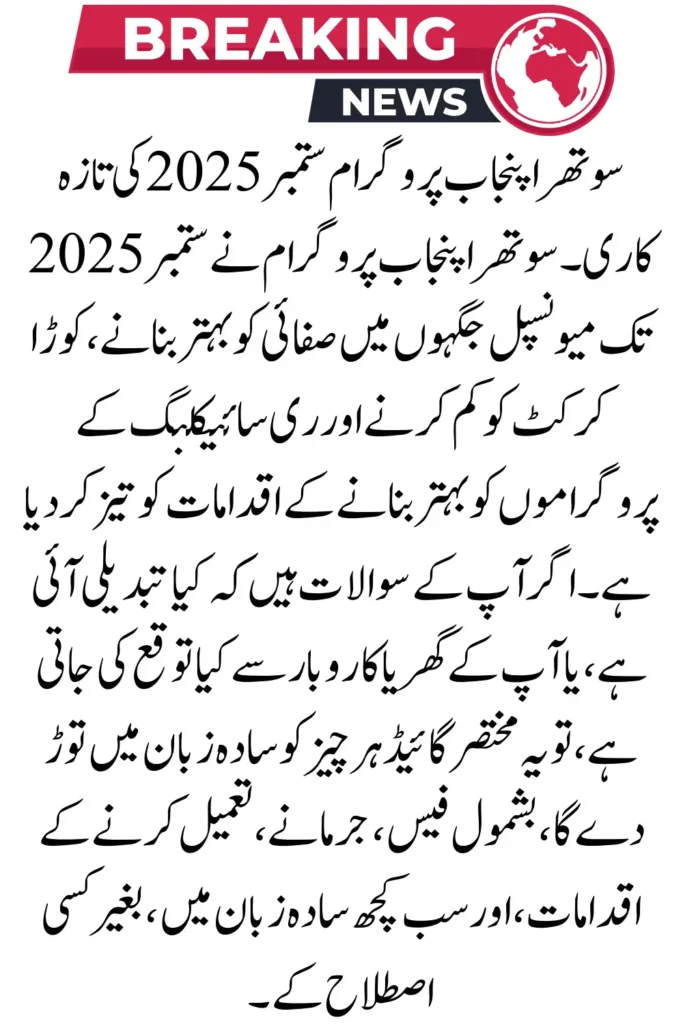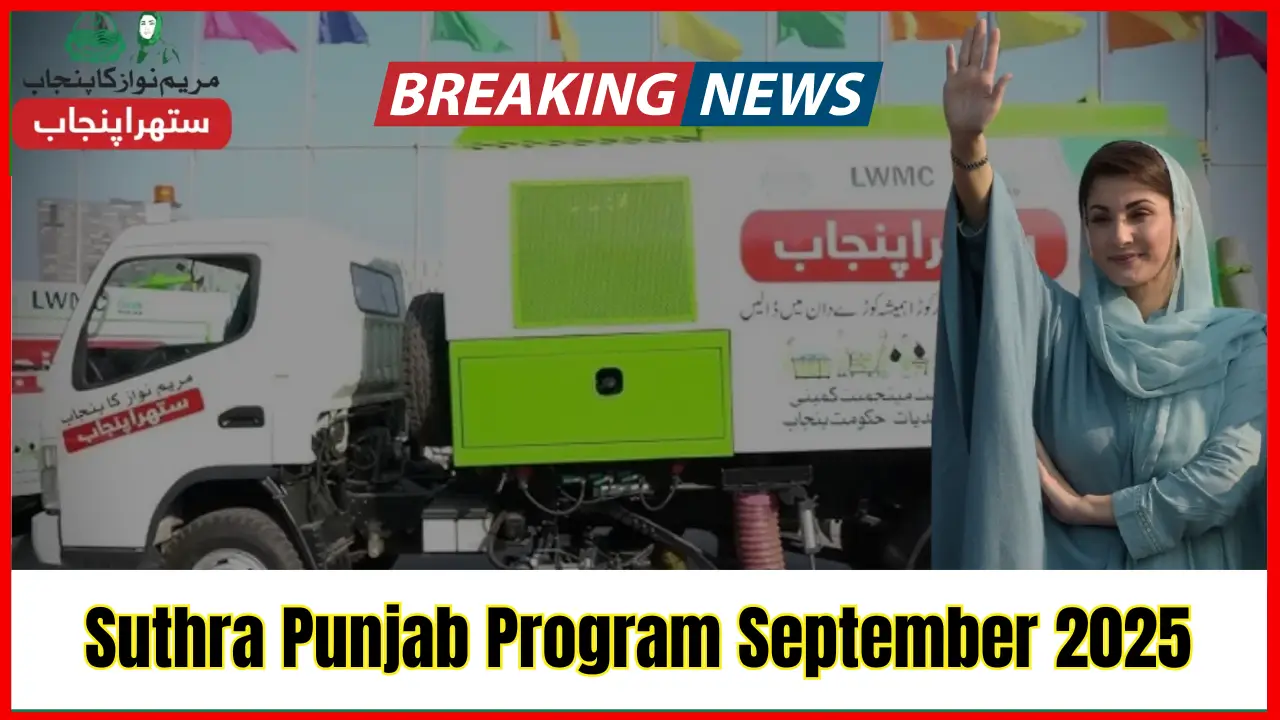Suthra Punjab Program September 2025 Update
Suthra Punjab Program September 2025 Update. The Suthra Punjab Program has, as of September 2025, stepped up measures to improve cleanliness in municipal spaces, decrease littering, and improve recycling programs. If you have questions about what has changed, or what is expected of your home or business, this short guide will break everything down in plain language, including fees, fines, measures to comply with, and everything else in plain language, with no jargon.
What’s New from September 2025?
- Monthly Cleanliness Bills: Now introduced in major cities and upscale areas. Charges are slab-based, depending on property size and type.
- Zero-Waste Zones: Neighborhoods where open dumping is banned, inspections are routine, and on-spot fines apply.
- Recycling & Waste-to-Energy (WTE): Focus on turning waste into reusable materials and electricity, reducing landfill pressure.

How the Suthra Punjab Program Affects You
- Expect a small monthly charge linked to your property’s size and type.
- Residential homes pay less, while larger houses and commercial outlets fall in higher slabs.
- In zero-waste zones, segregation and proper disposal are compulsory, with penalties for violations.
Cleanliness Charges — Simple & Slab-Based
For Households (Illustrative):
- 5-Marla home: ~Rs. 300/month
- 10-Marla home: higher than 5-Marla (next slab)
- 1-Kanal & above: progressively higher charges
For Commercial Units (Illustrative):
- Small shops/offices: higher than residential charges
- Large plazas/outlets: up to ~Rs. 5,000/month (category-dependent)
Your official municipal bill will confirm the exact charges for your address.
Punjab Honhaar Undergraduate Scholarship 2025 – Last Date 15th September
Zero-Waste Zones – Rules That Matter
- No open dumping or burning.
- Segregate at source: wet (kitchen) vs. dry (plastic, paper, metal).
- Follow collection windows – place bags outside only at scheduled times.
- Report missed pickups via official helplines or apps.
Why These Changes?
The program aims to shift from reactive cleanup to proactive prevention.
- Segregation boosts recycling efficiency.
- WTE plants generate power from non-recyclable waste.
- Routine billing ensures steady services, workforce planning, and equipment maintenance.
Tangible Benefits for Citizens
- Cleaner neighborhoods with regular door-to-door collection.
- Better health with less smoke, pests, and roadside dumping.
- Fair fees based on property size, not flat rates.
- Environmental benefits: reduced landfill, more recycling, and renewable energy from waste.
Compliance Checklist (For Homes & Shops)
- Keep two bins: wet & dry.
- Always tie and bag waste properly.
- Put waste out only in the assigned time slot.
- Never dump near drains or empty plots.
- Keep bills/receipts for inspections.
- If you use a private collector, confirm they deliver waste to official collection points.
Fees, Fines & Appeals
- Fees: Slab-based, published by municipal authorities.
- Late/Non-payment: May lead to surcharges or disruption of services.
- Fines: For littering, open burning, or illegal dumping (especially in zero-waste zones).
- Disputes: File appeals via official channels with your property ID and proof (like photos).
Recycling & WTE – The Big Picture
- Recycling works only if households separate waste.
- Clean, dry recyclables (plastic, paper, metals) can be reused.
- Residual waste is processed in WTE plants, producing electricity and reducing greenhouse gases from landfills.
- Your daily segregation habit fuels this cycle.
FAQs
Q1. What is the bill for a 5-Marla house?
👉 Around Rs. 300/month, but check your official bill for the exact slab.
Q2. Do all areas have the same slabs?
👉 No. Each municipality issues separate categories and notifications.
Q3. What if my waste pickup is missed?
👉 Report via the official helpline/app with date, time, and photos.
Q4. Do I have to segregate waste?
👉 Yes. It’s mandatory in zero-waste zones and improves recycling efficiency.
Q5. Can open plots be used for temporary dumping?
👉 No. It’s strictly prohibited and fined.
Pro Tips for Households & Shops
- Label bins for easy segregation.
- Train shop staff to follow pickup schedules.
- Set weekly reminders for compliance.
- Keep a simple log of any missed collections for quick resolution.
Conclusion
The Suthra Punjab Program is no longer a sporadic cleaning effort; it is now a system of service based on rules, requests, billings, and fines. By paying a monthly fee, sorting your waste as designated, and using the official customer complaint process, you are helping with cleaner streets, better public health, and a greener Punjab.
👉 Go all-in with the Suthra Punjab Program—because a cleaner city starts with you.
National Bank of Pakistan Jobs 2025 – Apply Online for Relationship Managers
